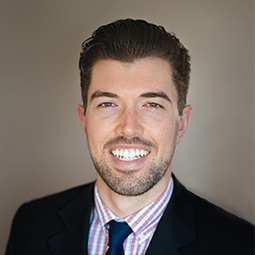Humanitarian Catastrophe as Masses Flee to World’s Poorest Nation
“They ran away with nothing”
I’ve been there and I’ve seen it for myself.
I just returned from our latest visit to Sudan and South Sudan, and the situation is worse than I had imagined. Seeing families’ heartbreaking tragedies, the horrific effects of war, the battle against starvation firsthand, is overwhelming. The need is colossal.
But knowing I work with a team that makes a difference in suffering people’s lives means more to me than ever. As well as my gratitude to the donors who stand with us to make this happen.
South Sudan has just been ranked the world’s poorest country. At the same time, people are fleeing in droves to this destitute nation for help. With the number displaced by Sudan’s war surpassing 9 million people, the IRC says this is “the largest displacement crisis in the world.”
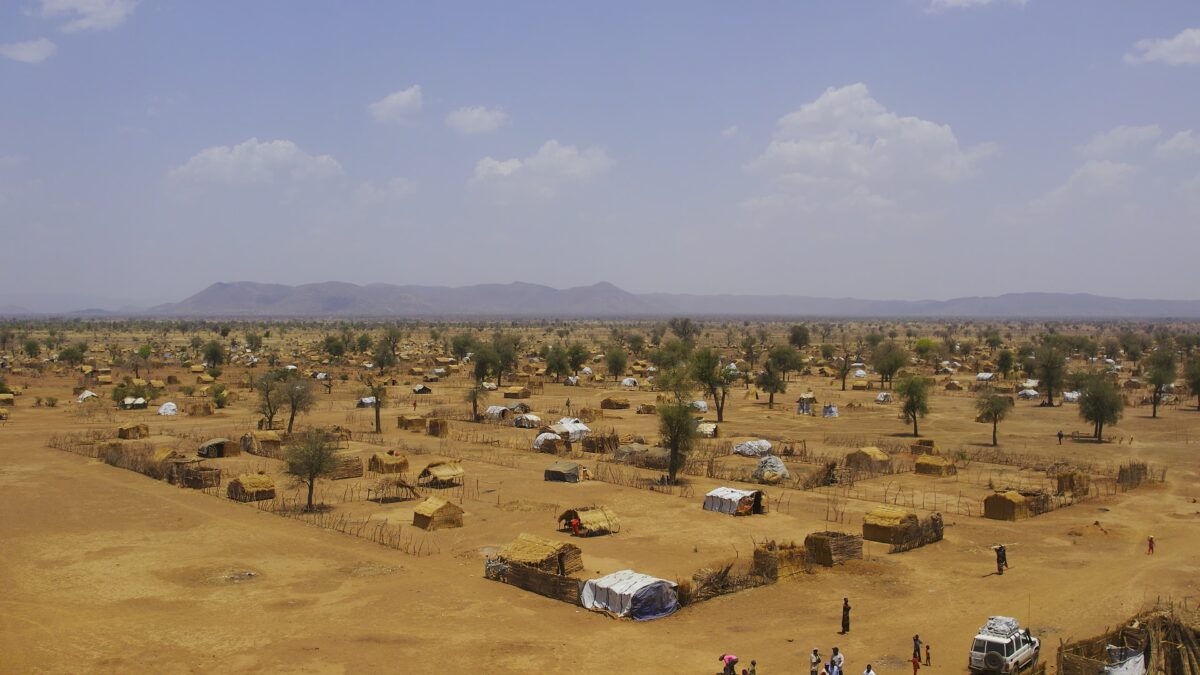
This tent city stretches for miles. More families arrive daily stretching scant resources in what’s become the world’s worst food crisis.
To put the crisis in perspective, families are risking their lives to come to a desperately poor country with no resources to help them – because it’s preferable to being in the crossfire of Sudan’s violent war.
In the truest sense, they have no other choice.
Nowhere Left to Go
In Sudan’s capital city of Khartoum, homes and neighborhoods are destroyed. Places of business are abandoned. Hospitals are closed.
I talked with Samar who was undergoing cancer treatment in Khartoum when the fighting started. She had nowhere to go when the hospitals shut down. One of the effects of her cancer was a swollen right leg that made walking painful and difficult.
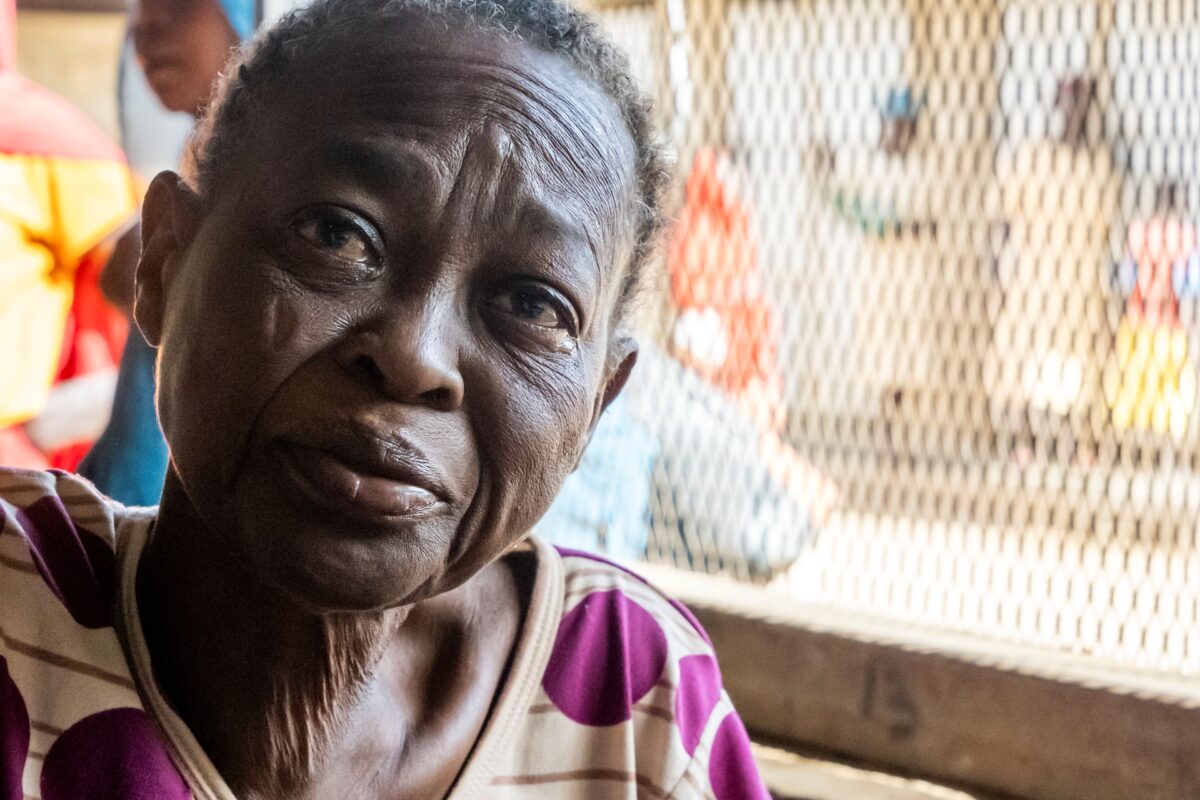
Samar was undergoing cancer treatment when hospitals shut down. Now she and her daughter fear starvation at the refugee camp where desperate residents eat leaves and locusts to survive.
Samar’s daughter helped get her mother out of the city and make the journey all the way to Mother of Mercy Hospital in the Nuba Mountains, a facility you help support. Despite her mother’s cancer and swollen leg, the pair traversed over 500 miles to get there. It took weeks. But it was the only place they could still find help.
Their story is just one example of what people are facing here. There are stories like theirs in every tent and every rescue boat holding displaced families.
FAST FACTS ON THE REFUGEE CRISIS
- The war in Sudan is triggering the world’s largest hunger crisis
- People in Nuba are eating leaves and locusts to fight starvation
- Refugees in South Sudan forage for roots and leaves to supplement their meager rations
- Children are suffering the worst effects of malnourishment in refugee camps, says UN
Meanwhile, the humanitarian crisis broils, as more and more people rush across South Sudan’s borders to escape war, or seek refuge in Sudan’s remote Nuba Mountains.
What We Saw in Nuba
At camps we visited in the Nuba Mountains, aid efforts are overwhelmed. The entire population of Nuba is 1.5 million people. Now over 700,000 refugees have descended on the area.
There’s not enough food, clean water, or latrines. Flies are everywhere. Starvation is a looming threat. People here are eating locusts and leaves to keep from starving. Yet the Nuba people share the pittance of food they have with refugee families. Despite these dismal conditions, the displaced in Nuba expressed to us it’s still better than being in the middle of the brutal warfare they escaped.
Dr. Tom Catena of Mother of Mercy Hospital said the situation in Sudan is “the worst he has seen in his 15 years.”
Faces of War
In Nuba we were met with stories of unfathomable resilience. People like young Kalo at Mother of Mercy Hospital. This boy was the heartbreaking victim of a recent school bombing. Despite his traumatic injury, he couldn’t wait to show us his scars. Kalo was relieved to no longer be in pain from his irreparably damaged leg. His optimism was humbling.
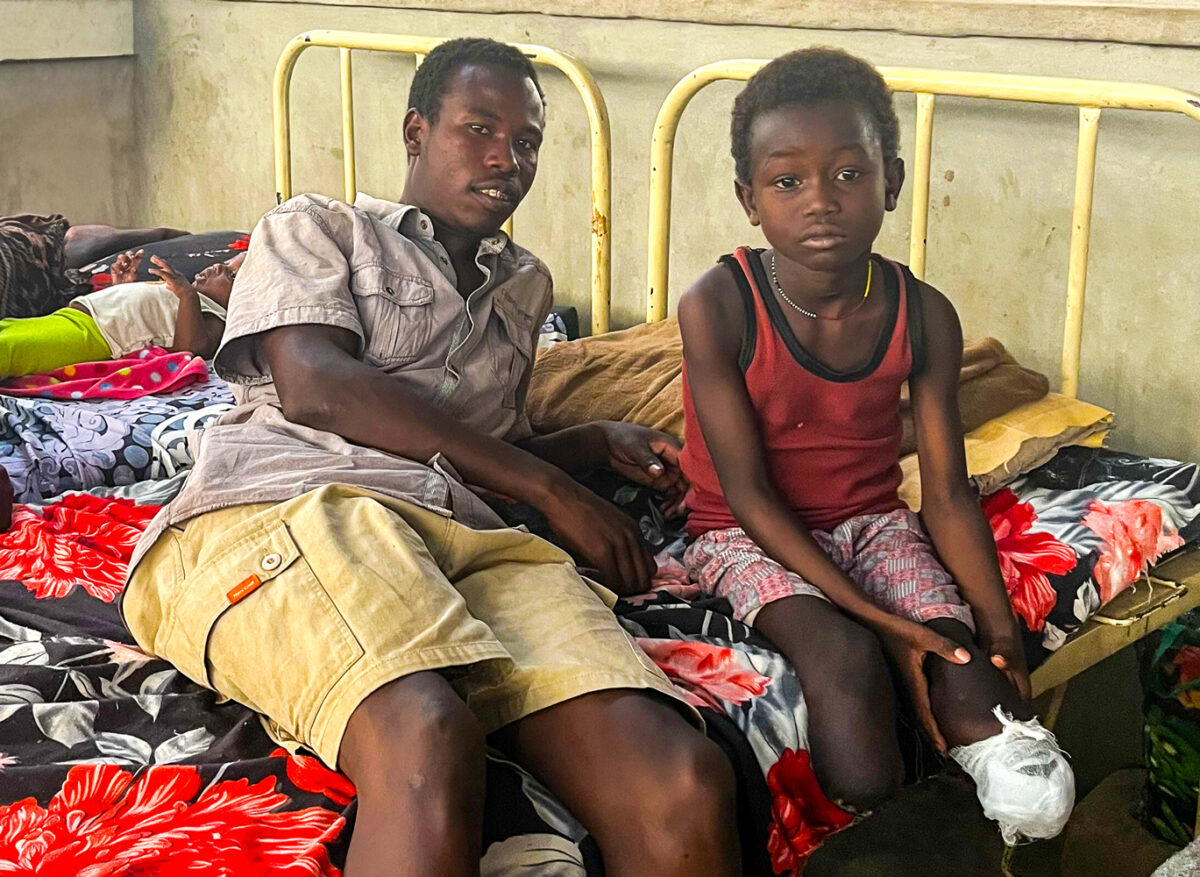
Innocent victims like little Kalo pay the terrible price of war. Without your support, others will not be able to receive the life-saving surgery he needed.
Refkha is one of the displaced mothers we met at the refugee camp. Her family’s home was bombed in Khartoum. She suffered a terrible injury, losing her leg in the bombardment. Somehow she managed to get her three children to this refugee camp in the Nuba mountains. They are now living in one of the hottest places on the planet. The day our team visited, it was 120 degrees F (48 degrees C). Despite everything Refkha has gone through and still endures, she remains hopeful for the future.
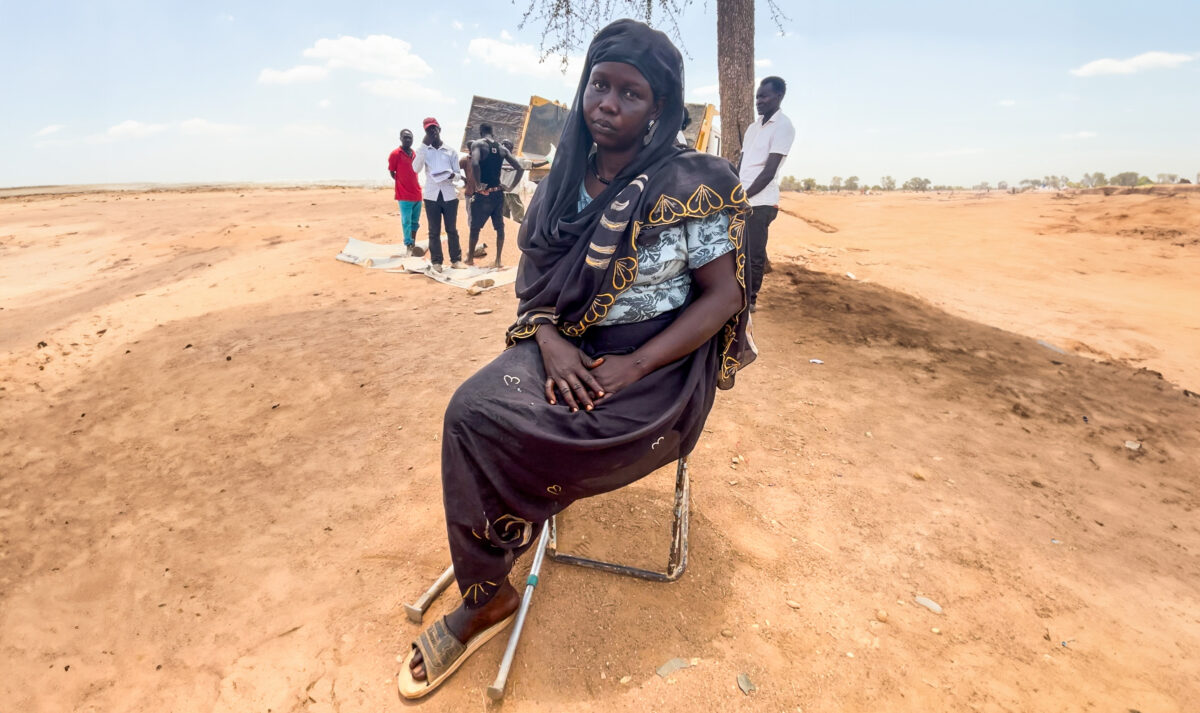
Refkha lost her leg in the bombing of Sudan’s capital. Despite that, she still found a way to help her three children out alive. Now they fear starving in a desolate Nuba camp.
Masses Landing in Malakal Camp
We traveled on to Malakal. We watched as displaced people lined up to wait their turn for food rations, which consisted of one cup of grain and a portion of cooking oil. This was to last them an entire week. On a good day there might be one or two other small items. Rations remain small to ensure they can be divided among the steady flow of newcomers adding to the camp’s population every day.
The contrast between our visit last year and one year later was shocking. A year ago we saw a few hundred people gathered under the trees, with almost no infrastructure in sight.
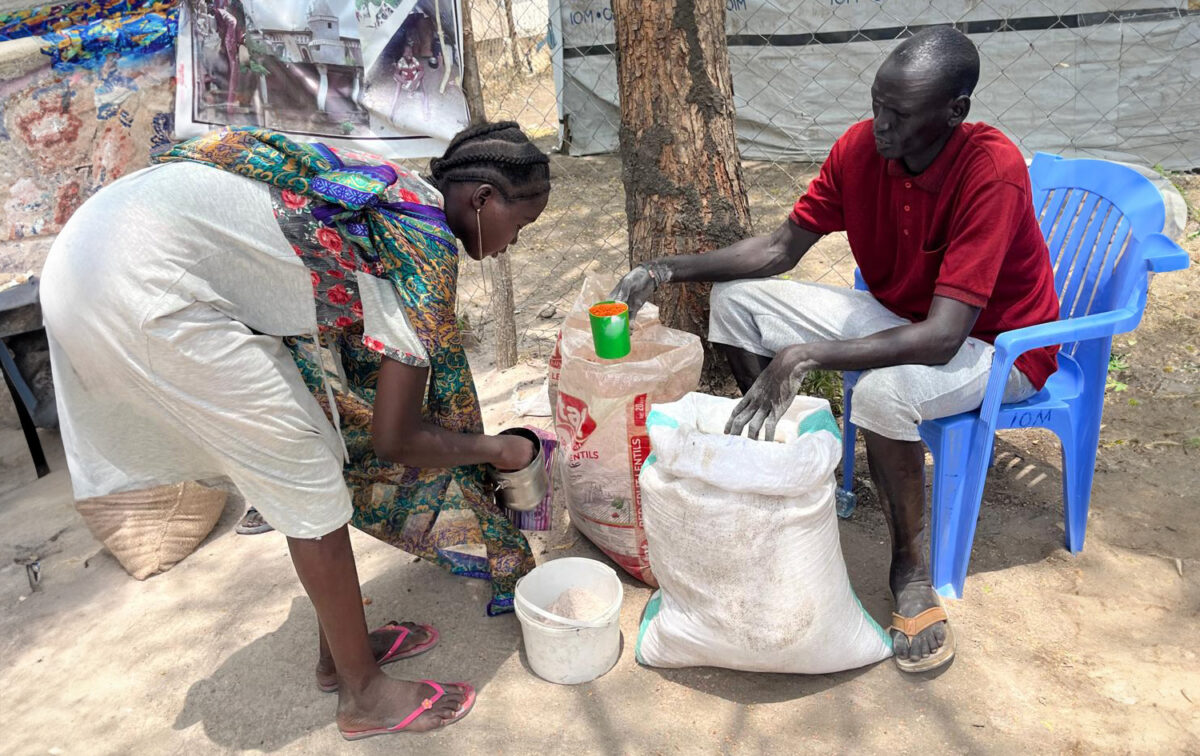
Rations for a family are one cup of grain and some oil. This has to last
for a week until the next rations are distributed.
Today the view spans across thousands and thousands of tents stretching as far as the eye can see to the horizon. It tells the story of family after family forced to leave their homes and everything behind – most enduring grueling hardship to get here.
In Malakal, we continue to provide transportation by boat for people still escaping Sudan. Your support keeps this rescue boat running. You also provide food and other basic essentials for families who’ve traveled for days, sometimes weeks, for their chance to make the two-day journey downriver away from the war. They bring little. At this point, all they have left is their lives.
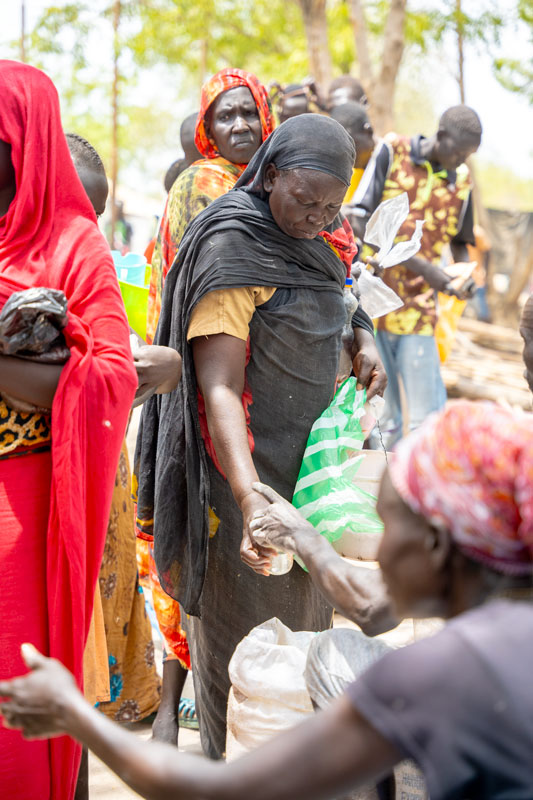
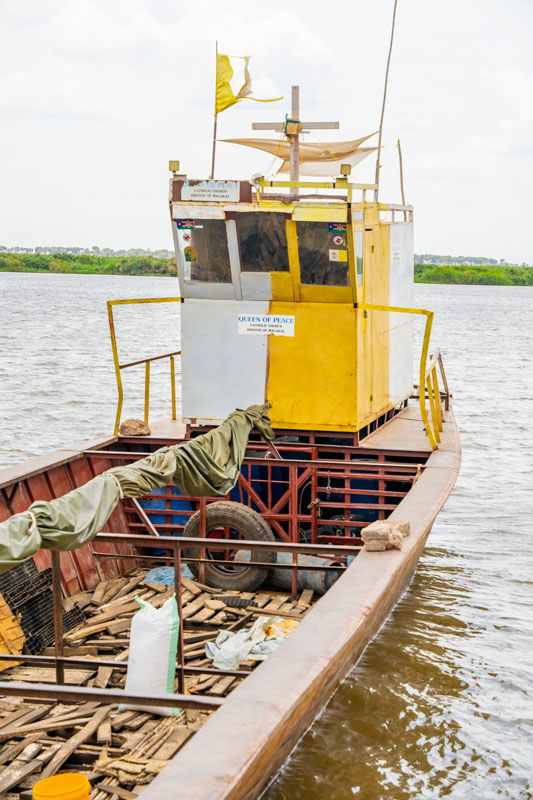
A cross stands as a symbol of hope for those escaping the war on this humble rescue boat. Only meager rations are available when they arrive due to the massive influx of refugees.
Hunger is a daily reality here. Starvation remains a constant threat. Not only for newly arriving refugees, but also in their overwhelmed host country. In parts of South Sudan, people eat nothing but water lily roots – the only food that can grow beneath floodwaters that cover their former farmland. It is literally their only meal each day.
Desperate Need for Help
While the situation is grim, relief from Sudan Relief Fund has been crucial to help families survive while they await help from slower moving global organizations.
Bishop Stephen Nyodho of the diocese of Malakal shared his gratitude for our swift response to crises. Global organizations can take months to perform assessments and site surveys, he said. But “Sudan Relief Fund’s help is immediate,” he told us. “We are very grateful for this intervention, which means we can provide food immediately.”
Your support has been crucial to bring families to safety. Your gifts have helped deliver food to starving refugees in Malakal, and medicine to Sudan’s isolated Nuba Mountains. Working with our network of partners on the ground, we continue to be uniquely equipped to get supplies to those who need them into the places they’re needed most.
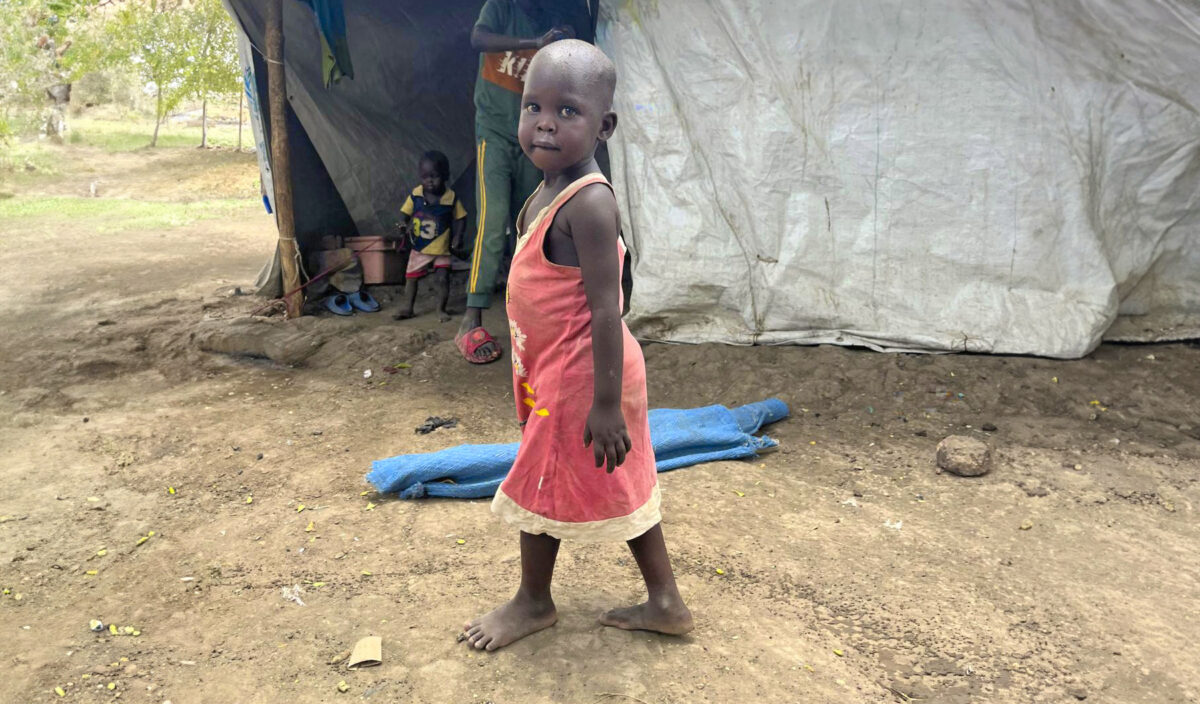
Children’s growth is forever stunted by malnutrition. Your support means she and others like her can eat today and avoid starvation.
But the demand is so vast and difficult to comprehend. We can’t do this without your continued help.
If you’re able, please consider partnering with us to care for those whose lives are in the balance. Ongoing support means we can provide dependable, reliable assistance to help families in an environment where violence and turmoil means nothing is certain. Regular support means no child has to starve.
Lives in the Balance
Please rush a gift today to give food, clean water, and shelter to families victimized by war.
Bishop Stephen told us, “When the war broke out, they ran away with nothing. The people need food, shelter, clothing. Everything.”
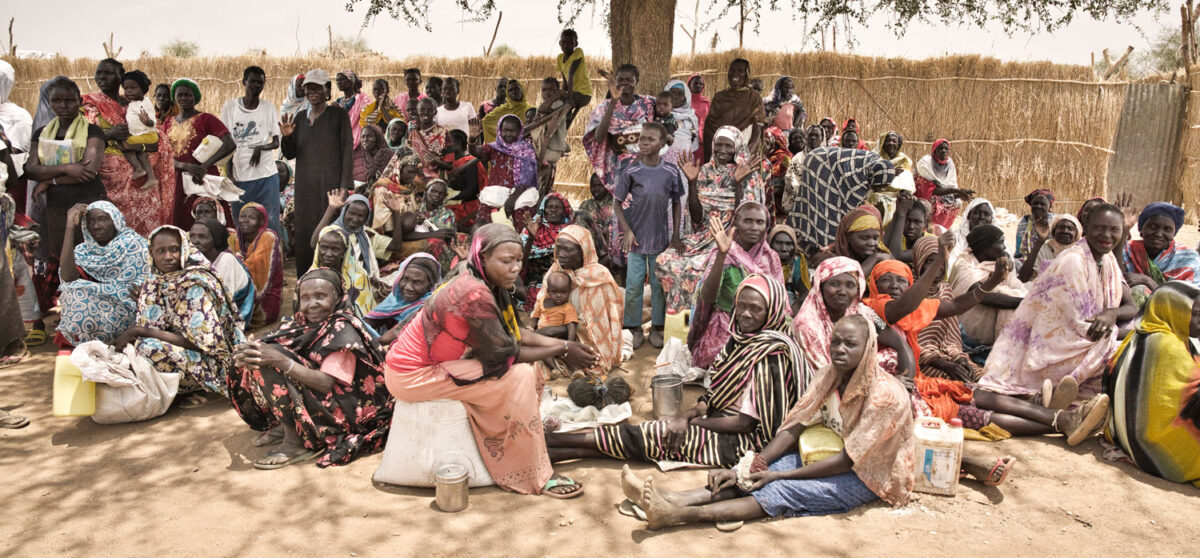
“Once you see the need, you can’t look away. It stays with you and compels you to do something.”
– Matt Smith of Sudan Relief Fund on his recent visit
If you’d seen what I’ve seen, you’d be moved by the tragedy of so many people who only a year ago were living in their homes and going about their lives – now they’re devastated. Once you see the need, you can’t look away. It stays with you and compels you to do something about it.
Nevertheless, you see examples of incredible courage and hope like Kalo and Refkha. It’s because of people like you who reach out in their time of crisis that they can have hope. As the Bishop said, “Someone needs to eat today, not tomorrow.”
Please help us keep making this possible for people whose lives are in the balance.
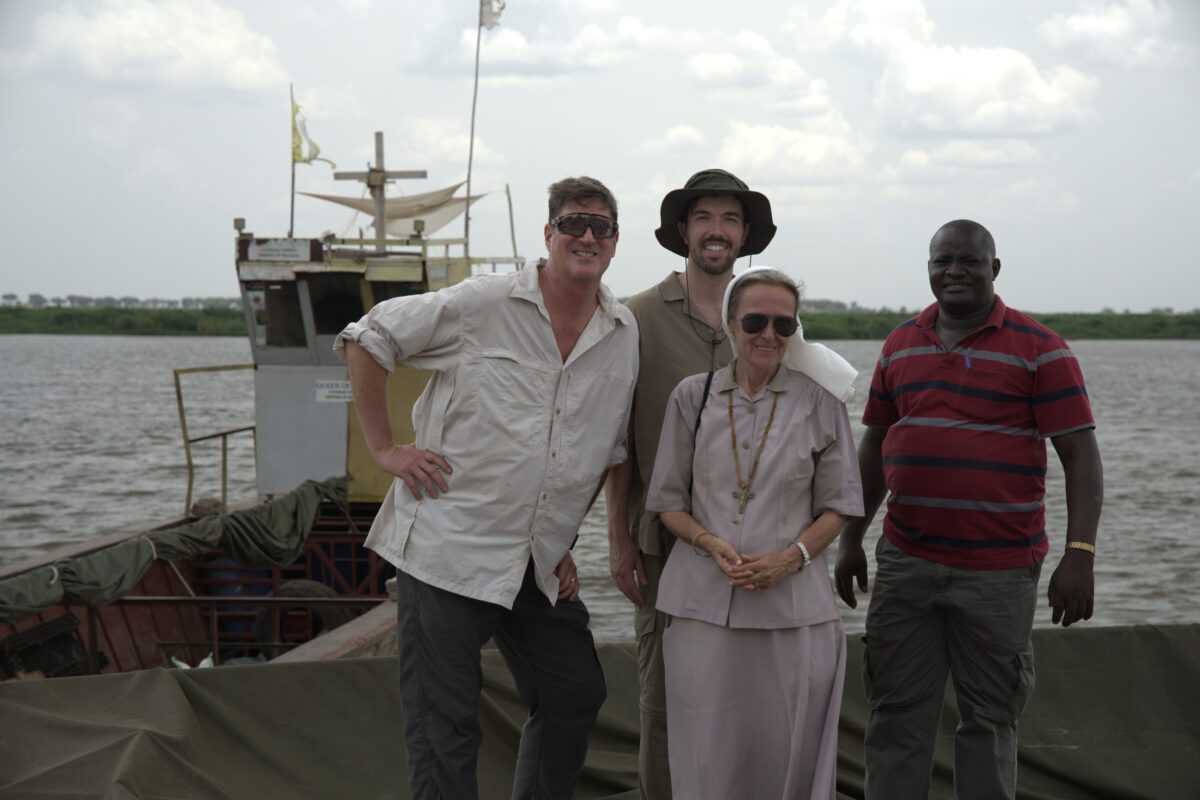
The Sudan Relief Fund team of Dave Dettoni, Matt Smith, and Fred Otieno work with Sister Elena Balatti of Caritas to get help quickly to the many refugees in urgent need.
PS - I’ve just returned from refugee camps in Sudan and South Sudan. While the stories are heartbreaking, your support is making a lifesaving difference. Your contribution will go so far to help a hungry family. Would you please act today? Every gift counts.
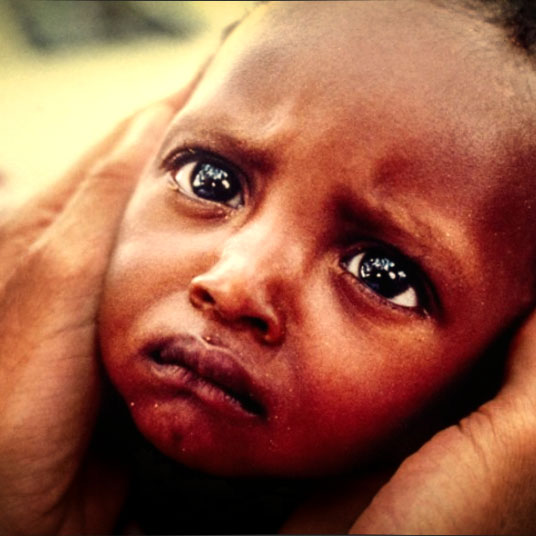 Increase Your Gift at No Extra Cost!
Increase Your Gift at No Extra Cost!
Did you know you may be able to double the amount of your gift without giving an additional dollar of your own? Thousands of companies participate in Corporate Match programs. This means they match dollar-for-dollar the amount their employees donate to charitable organizations – doubling your gift! Imagine creating twice the impact of your contribution.
Learn more about the Corporate Match Program.



